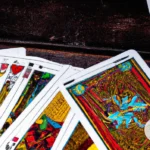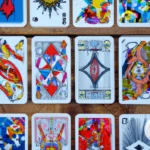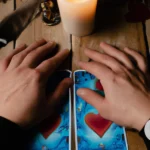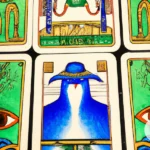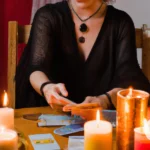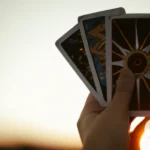As tarot card readings continue to gain popularity, many seasoned practitioners and newbies alike find themselves perplexed by the Court Cards. These cards often depict individuals, such as knights, queens, and kings, and can play a significant role in relationship readings. Understanding how to interpret and use these cards can help shed light on the personalities, advice, and possible outcomes of any given relationship. In this article, we’ll explore the role of Court Cards in relationship readings, as well as tips for reading and incorporating them into relationship spreads. So let’s dive in and unravel the mysteries of these intriguing cards!
Understanding Court Cards
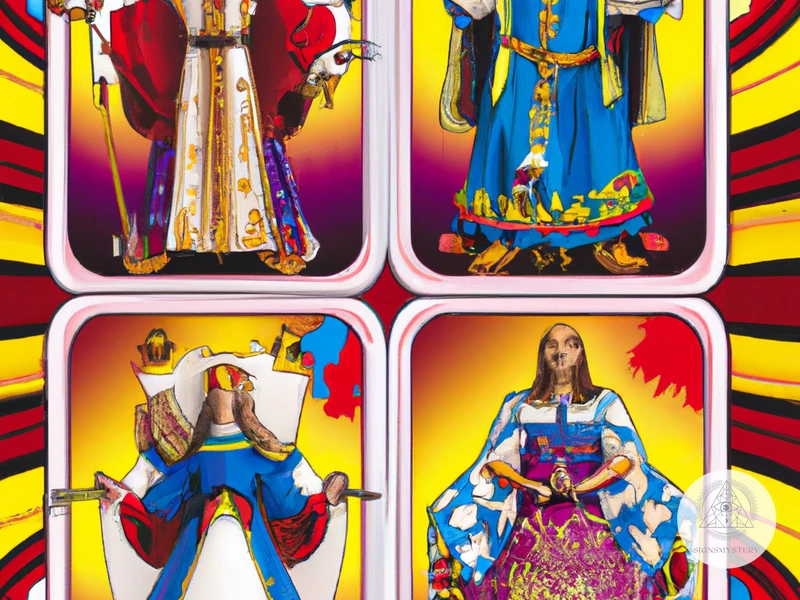
When it comes to tarot reading, court cards can be some of the most intriguing and challenging symbols to interpret. These cards can represent personalities, behavior patterns, and even future outcomes. To truly understand the role of court cards in relationship readings, we must first delve into what they are, the meanings behind each of the different courts, and how they can be interpreted in a tarot spread. If you’re feeling perplexed by the court cards, don’t worry – by the end of this section, you’ll be equipped with a deeper understanding and the ability to interpret them with confidence. You can also check out valuable materials on tarot court card traits, court card personality and behavior, or court card symbolism and titles for further insights.
What are Court Cards?
Court cards are a subset of tarot cards, which are commonly used in divination to gain insight into one’s life or situation. These cards are also known as “face cards” or “royalty cards,” and they are often depicted with human figures in courtly attire, holding various emblematic symbols.
The court cards represent different personality types and archetypes that can be embodied in a person, including their characteristics, skills, and energies. These cards can represent people in a reading, or they can serve as advice, warnings, or indicators of future outcomes.
There are typically four courts in a tarot deck, each one representing a different element, suit, and energy. The courts usually consist of a King, Queen, Knight, and Page, although there may be some variations in different tarot decks.
The Kings and Queens are often associated with mature and powerful energy, representing authority, leadership, and mastery. The Knights are linked to action, movement, and adventure, while the Pages often represent youthful or apprentice energy, creativity, and inspiration.
Court cards play an essential role in tarot readings, especially in relationship readings. They can reveal hidden aspects of a person’s character, offer guidance or warnings, and provide insight into one’s romantic life.
For more information on court cards in tarot spreads, you can check out this article on court cards tarot spreads. If you’re looking to memorize the meanings of each court card, you may find this resource on memorizing court cards helpful. Additionally, if you’re curious about how reversed court cards can impact a tarot reading, you can visit this page on reversed court cards in tarot.
The Different Courts and Their Meanings
To fully understanding Court Cards and their role in relationship readings, it’s important to explore the different Courts and their unique meanings. Court Cards can be divided into four suits: Wands, Cups, Swords, and Pentacles.
Each suit represents a different element and has its own set of personality traits and meanings associated with the Courts. The table below provides a brief overview of each suit and its Courts:
| Suit | Personality Traits and Meanings |
|---|---|
| Wands | represents Fire, creativity, energy, passion, ambition, and action-oriented individuals.
|
| Cups | represents Water, emotions, intuition, creativity, and relationships.
|
| Swords | represents Air, intellect, reason, communication, and conflict.
|
| Pentacles | represents Earth, material possessions, career, finances, and practicality.
|
It’s important to note that while the Court Cards have their traditional meanings, interpretation may vary depending on the context of the reading and the individual reader’s intuition.
Interpreting Court Cards in Relationship Readings
When it comes to interpreting court cards in relationship readings, there can be some perplexity. These cards can represent different personalities, advice or future outcomes. As with any tarot reading, it’s essential to consider the broader context of the subject’s question. In this section of the article, we’ll explore how to interpret court cards in relationship readings, including their interpretation as personalities and temperaments, advice and warning signs, and future outcomes. Additionally, we’ll take a closer look at spreads that incorporate court cards and offer some tips for reading these cards in relationships.
As Personalities and Temperaments
When interpreting court cards in relationship readings, one approach is to view them as representations of different personalities and temperaments. Each court card can offer insights into the characteristics and traits of individuals involved in the relationship. Here are some key things to keep in mind while interpreting court cards as personalities and temperaments:
- Consider the suit: Each suit in the tarot deck represents different aspects of life, so it’s important to take into account the suit of the court card. For example, the Wands usually represent passion and creativity, while Swords are associated with intellect and communication.
- Pay attention to the gender: While gender is not always an indicator of personality, court cards can provide valuable information about the attitudes and behaviors of individuals based on gender. The King of Cups, for instance, is often seen as emotionally mature and in control of their emotions, while the Queen of Swords is a symbol of power and intelligence.
- Look at the physical attributes: The physical characteristics of court cards can also offer clues about the personalities they represent. For instance, the Knight of Pentacles is often depicted as a hardworking and reliable individual, while the Knight of Wands is energetic and spontaneous.
- Consider the position: The position of the court card in the spread can also influence its interpretation. A court card that appears in a past position, for example, may indicate a previous relationship or a significant individual in one’s past.
By viewing court cards as representations of different personalities and temperaments, tarot readers can gain deeper insights into the dynamics of relationships. It’s important, however, to remember that these interpretations are not definitive and can vary depending on the context of the reading.
As Advice and Warning Signs
When interpreting Court Cards in relationship readings, it’s essential to look beyond their personality traits and consider them as advice and warning signs. Here are some key points to keep in mind:
- Look at the position of the card: Court Cards appearing in the past position can indicate past relationships or experiences that may be affecting the present. In contrast, a Court Card in the future position can signify someone who may come into the querent’s life.
- Consider the suit: Each suit has its unique characteristics, and Court Cards in a specific suit can reveal specific advice or warnings. For instance, a Knight of Cups may indicate the importance of emotional expression and creativity, while a Knight of Swords could suggest the need for clear communication and logical thinking.
- Pay attention to the card’s message: The message of the card can also be essential, particularly if it appears reversed. For example, a reversed Queen of Pentacles could suggest a lack of financial stability or a lack of nurturing in the relationship.
- Use your intuition: Finally, don’t forget to use your intuition when interpreting Court Cards. Your insights and personal associations can provide valuable insights into the meaning of each card and the relationship as a whole.
By taking these factors into account, we can see Court Cards as not only descriptions of personality but also as powerful tools for guidance, advice, and even warnings in relationship readings.
As Future Outcomes
One way to interpret court cards in relationship readings is by examining them as indications of future outcomes. This can be done by analyzing the suit and the specific card in question. Here are some examples of how court cards can be seen as potential future outcomes:
| Court Card | Outcome Interpretation |
|---|---|
| King of Cups | The relationship will be emotionally stable and harmonious. The individuals involved will be supportive and understanding of each other’s feelings. |
| Queen of Swords | The relationship could be filled with intellectual discussions and debates, but there may be a lack of emotional connection. |
| Knight of Wands | The relationship may be adventurous and passionate, but with a potential for impulsiveness and recklessness. |
| Page of Pentacles | The relationship will be grounded in practicality and may involve a focus on financial stability and material possessions. |
It’s important to note that these interpretations are not set in stone and can be influenced by other cards in the spread or the overall energy of the reading. These interpretations should also be taken with a grain of salt, as future outcomes are not always predictable or certain.
When interpreting court cards as future outcomes, it’s crucial to look at the card within the context of the question or spread. For example, if the spread is focused on a specific aspect of the relationship (such as communication or intimacy), the court card can provide insight on how that aspect will play out in the future.
Interpreting court cards as potential future outcomes can add depth and nuance to relationship readings. By examining the suit and specific card in question, readers can gain insights into how the relationship may evolve and what challenges or strengths may lie ahead.
Court Cards and Relationship Spreads
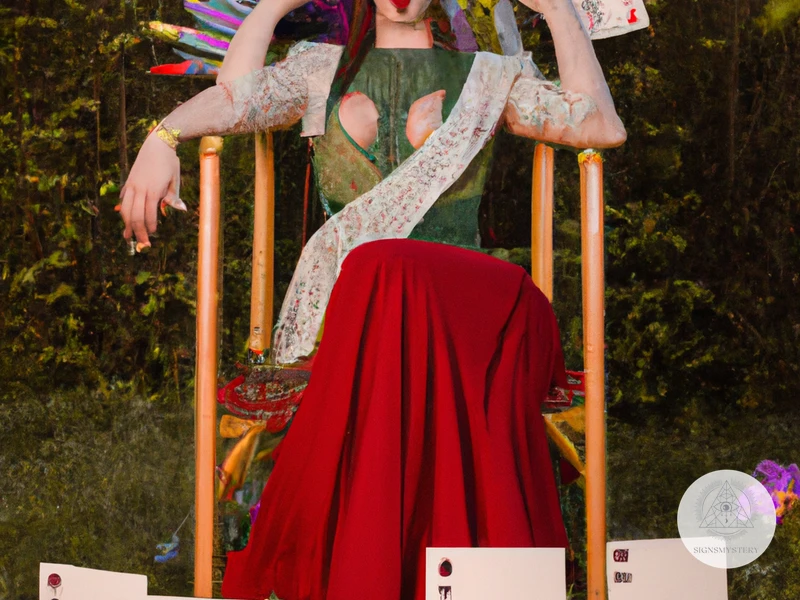
When it comes to relationship readings, incorporating court cards into spreads can provide a wealth of information and insight. The question is, which spreads work best and how can you interpret the court cards within them? In this section, we’ll delve into the world of court cards and their role in relationship readings, exploring the different spreads available and the interpretations associated with them. So, if you’re feeling perplexed about incorporating court cards into relationship spreads, fear not – we’ve got you covered.
Which Spreads Can Incorporate Court Cards?
When it comes to incorporating Court Cards into relationship readings, there are several spreads that can be used to glean insights into different aspects of a relationship. These spreads are designed to provide a comprehensive analysis of the relationship and can be used in conjunction with Court Cards to provide a nuanced and detailed interpretation.
Some spreads that can incorporate Court Cards include:
- The Relationship Spread: this spread is designed to provide insight into the overall dynamics of a relationship, as well as any areas of conflict or tension. It typically involves laying out cards in a specific pattern, with each position representing a different aspect of the relationship, such as communication, emotional connection, and shared goals. Court Cards can be used to represent different individuals involved in the relationship and can provide insights into their personalities, attitudes, and behaviors.
- The Three-Card Spread: this spread involves drawing three cards to represent past, present, and future aspects of a relationship. Court Cards can be used to represent different individuals involved in the relationship, allowing for a deeper understanding of the influence that different personalities and temperaments have on the relationship’s trajectory.
- The Celtic Cross Spread: this is a more complex spread that involves ten cards, each representing a different aspect of the relationship. Court Cards can be used to represent different individuals involved in the relationship and can provide insights into their roles and behavior patterns. This spread is often used for more in-depth analysis and can reveal underlying issues that may be impacting the relationship.
- The Ellipse Spread: this spread involves laying out cards in an ellipse or circular pattern, with each position representing a different aspect of the relationship. Court Cards can be used to represent different individuals involved in the relationship, as well as advice and warnings that may be present. This spread is useful for gaining a holistic view of the relationship and can provide insights into both positive and negative aspects.
- The Five-Card Spread: this spread involves drawing five cards to represent different aspects of a relationship, including the past, present, and future, as well as advice and potential outcomes. Court Cards can be used to represent different individuals involved in the relationship, as well as different energies and influences that may be present.
Each of these spreads can be customized to suit the specific needs and questions of the querent, and Court Cards can be incorporated in a variety of ways to provide a deeper and more nuanced interpretation of the relationship.
Example Spreads and Interpretations
When incorporating Court Cards into relationship spreads, there are various ways to approach the interpretation of the cards. Here are some examples of spreads and some interpretations:
- The Past, Present, and Future Spread: In this three-card spread, the first card represents the past, the second card represents the present, and the third card represents the future of the relationship. If the Knight of Cups shows up in the past position, it could indicate a romantic and exciting start to the relationship. The Queen of Swords in the present position might suggest that communication and clarity are important in the current state of the relationship. The Three of Pentacles in the future position could indicate a harmonious and successful partnership built on cooperation and teamwork.
- The Strengths and Weaknesses Spread: In this four-card spread, the first card represents the strengths of the relationship, the second card represents the weaknesses, the third card represents what can be done to improve the relationship, and the fourth card represents the potential outcome. If the King of Cups shows up as a strength, it could suggest that the partners are emotionally invested and supportive of each other. The Page of Wands in the weakness position might indicatea lack of focus or commitment in the relationship. The Three of Cups in the improvement position could suggest that the partners need to celebrate and enjoy each other’s company more often. The Queen of Pentacles in the outcome position could indicate a stable and nurturing long-term relationship.
Subscribe to Our Newsletter
Sign up to receive the latest news and updates.
- The Yes/No Spread: This two-card spread is used to answer a simple yes or no question about the relationship. If the Ace of Swords shows up, it could indicate a definite yes, as this card represents clarity and decisive action. If the Knight of Pentacles shows up, it could indicate a no, as this card represents caution and slow progress.
- The Celtic Cross Spread: This widely-used ten-card spread covers various aspects of the relationship, including the past, present, future, and obstacles. If the Queen of Cups shows up in the present position, it could indicate that the relationship is currently focused on emotional fulfillment and nurturing. The Four of Swords in the obstacle position might suggest that the partners need to take a break or rest from the relationship in order to gain clarity and balance. The Sun card in the outcome position could indicate a happy and joyful outcome, as this card represents contentment and positivity.
Remember that these interpretations are just examples and that the context of the specific situation, the question asked, and the other cards in the spread all play an important role in the overall reading. Try to approach the interpretation of Court Cards with an open mind and a willingness to dig deeper.
Tips for Reading Court Cards in Relationships
Reading court cards can be a challenging task for any tarot reader, especially when it comes to relationship readings. Each court card represents a complex personality and temperament, which can make it difficult to interpret its meaning in the context of a relationship. However, with the right approach, tarot readers can use court cards to gain insights and guidance for their clients. In this section, we’ll explore some tips and techniques that can help you read court cards more effectively in relationship readings. By using these strategies, you can enhance your understanding of court cards and deliver more accurate and helpful readings for your clients.
Look Beyond Gender and Appearance
When interpreting Court Cards in relationship readings, it’s important to look beyond gender and appearance. Here are some key points to keep in mind:
- Focus on the energy: Each Court Card represents a unique energy or personality type, regardless of the gender or physical appearance depicted on the card. For example, the Knight of Swords might represent someone who is focused, logical, and quick-witted, regardless of whether they are male or female.
- Consider the context: The meaning of a Court Card can also depend on the context of the reading and the other cards surrounding it. For example, the Queen of Cups might indicate a nurturing, emotional female figure in a general reading, but in a love reading, she could specifically represent the querent’s partner or an ideal partner they are seeking.
- Avoid stereotypes: It’s important to avoid making assumptions or relying on stereotypes based on the gender or appearance of a Court Card. For example, the King of Wands might appear to be a traditionally masculine figure, but in a reading, he could represent a passionate and charismatic individual of any gender.
- Use your intuition: Finally, don’t be afraid to trust your intuition and personal associations when interpreting Court Cards. Sometimes a card might remind you of someone you know, or the energy of a card might resonate strongly with a particular situation in the querent’s life. Trusting these impressions can help you gain deeper insight into the meaning of a Court Card.
By looking beyond gender and appearance, and instead focusing on the energy and context of each Court Card, you can provide more accurate and insightful relationship readings for your clients.
Consider the Context
When interpreting Court Cards in relationship readings, it’s important to consider the context in which they appear. Here are some factors to keep in mind:
- Situation: What is the querent’s current situation? Are they single, in a committed relationship, or somewhere in between? Are they experiencing problems in their relationship, or just seeking clarity?
- Question: What is the specific question or focus of the reading? This can help determine which Court Cards are most relevant.
- Other Cards: What other cards are in the reading? How do they interact with the Court Cards?
- Position: If the Court Card is part of a spread or layout, what position does it occupy? This can provide additional insights into its meaning.
Taking these contextual factors into account can help avoid misinterpretation of Court Cards. For example, a Knight of Cups may indicate a romantic and sensitive lover in a spread focused on a new relationship, but in a spread focused on a long-term relationship experiencing problems, it could point to unrealistic expectations and a lack of commitment.
Interpreting Court Cards in relationship readings requires careful consideration of the context in which they appear, as well as other cards in the spread and the specific situation and question at hand.
Use Intuition and Personal Associations
One of the most important things to keep in mind when interpreting Court Cards in a relationship reading is to use your intuition and personal associations. While it’s important to have a basic understanding of the traditional meanings of each card, it’s also crucial to listen to your inner voice and allow your own experiences to guide your interpretation.
One way to enhance your intuition is to create a personal association with each Court Card. For example, if the Knight of Cups reminds you of a past lover who was passionate but unreliable, you can use this as a guide when interpreting the card in a reading. Similarly, if the Queen of Wands brings to mind a confident, charismatic boss you once had, this can inform how you interpret her in a relationship spread.
To help you develop personal associations, you can create a table with each Court Card and jot down any words or images that come to mind when you think of each one. Here’s an example:
| Card | Personal Associations |
|---|---|
| Page of Cups | Childlike innocence, creativity, emotional sensitivity |
| King of Swords | Intellectual, logical, authoritative |
| Queen of Pentacles | Nurturing, practical, grounded |
| Knight of Wands | Adventurous, impulsive, passionate |
By creating a personal association with each Court Card, you can tap into your own intuition and interpret the cards in a way that feels authentic to you. This can help you provide more meaningful and insightful readings for your clients.
However, it’s important to remember that your personal associations should not completely override the traditional meanings of each card. Rather, they should be used to supplement your understanding and provide additional depth and nuance to your interpretations. Striking a balance between tradition and intuition is key to becoming a skilled and effective tarot reader.
Conclusion
In conclusion, Court Cards are a versatile and important part of tarot readings, especially when it comes to relationship readings. These cards represent different personalities, temperaments, and potential outcomes, and can provide valuable insight and guidance.
When interpreting Court Cards in relationship readings, it is important to consider their meanings beyond gender and appearance, and to look at the context of the reading. Using intuition and personal associations can also be helpful in providing more nuanced interpretations.
Incorporating Court Cards into relationship spreads can provide a wealth of information, and example spreads and interpretations can be found in tarot resources and books.
Overall, the Court Cards offer a unique perspective on relationship dynamics and can help seekers navigate challenges and opportunities in their love lives. By understanding and interpreting these cards, tarot readers can provide valuable guidance and insights that can lead to deeper understanding and growth.
Frequently Asked Questions
What makes Court Cards different from other Tarot cards?
Court Cards are unique in that they represent people, personalities, and relationships, while the other cards in the Tarot deck depict situations, events, and emotions.
How are Court Cards related to relationships?
Court Cards are often used in relationship readings to represent individuals, their characteristics, and the dynamics between them.
What does it mean when Court Cards appear in a relationship reading?
Depending on their position and the spread used, Court Cards can indicate the personalities, behaviors, and future outcomes of the people in the relationship.
Do Court Cards have fixed meanings?
Court Cards have archetypical meanings, but their interpretation may vary based on the reader’s intuition and the specific circumstances of the reading.
How can Court Cards help in improving relationships?
Court Cards can provide insights into the strengths and weaknesses of the individuals in the relationship, and highlight areas for growth, communication, and compromise.
Which Court Cards are commonly associated with romantic relationships?
The Pages and the Knights are often associated with the initial stages of romance, while the Queens and the Kings represent more mature and stable relationships.
Can Court Cards represent people who are not in the reading?
Yes, Court Cards can be used to represent people who are not physically present in the reading, but who may influence the relationship or be relevant to the question asked.
How can Court Cards be used in conjunction with other Tarot cards?
Court Cards can be paired with other cards in the spread to provide additional information and context, or to clarify their meaning in relation to the question or situation at hand.
Which spreads are best suited for incorporating Court Cards?
Spreads that focus on relationships, such as the Relationship Spread or the Celtic Cross Spread, are ideal for using Court Cards to explore the personalities, feelings, and outcomes of the people involved.
Do Court Cards always have positive meanings?
No, Court Cards can have both positive and negative connotations depending on the context and the surrounding cards in the spread.



